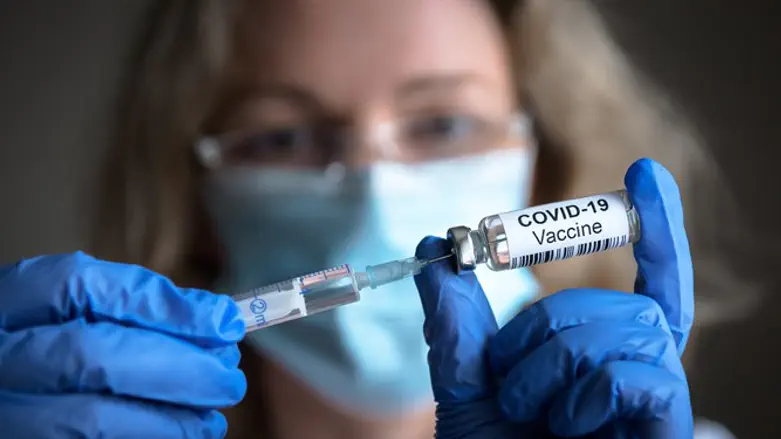
A new Israeli study on coronavirus immunity suggests that people who were previously infected with the virus benefit from significantly stronger and longer-lasting immunity than the immunity provided by vaccination alone.
The study, a retrospective observational study conducted by Maccabi Healthcare Services, Tel Aviv University, Ashdod University Hospital, compared Israelis from three groups: people who had received vaccine and were never infected (SARS-CoV-2 naïve), people who were previously infected and did not receive the vaccine, and people who were infected with SARS-CoV-2 and then vaccinated after recovering.
Researchers found that natural immunity is stronger and longer-lasting than vaccination, but also noted that a single-dose of vaccine likely can offer additional protection from the Delta Variant to those who recovered from SARS-CoV-2.
For the study, researchers analyzed anonymized Electronic Health Records, a database which covers records for 2.5 million people in Israeli, spanning March 1st 2020 to August 14th 2021.
The study grouped the subjects into categories based on vaccination status and previous infection, correcting for demographic factors including age, sex, location of residence, as well as the timing of infection or vaccination.
In the first analysis, which only compared natural immunity to vaccinated immunity among the SARS-CoV-2 naïve, two cohorts of 16,215 people each were studied, with equal representation of age, sex, location, and time of infection or vaccination.
This model showed 256 total cases of infection, 238 were ‘breakthrough infections’ of the vaccinated and COVID naive, while 19 were reinfections among the unvaccinated, previously infected group. Adjusting for comorbidities, vaccinated COVID-naïve people had 13 times greater risk for infection than did the previously infected.
Of 199 symptomatic cases, 191 were among the vaccinated, just 8 were among the previously infected. After adjusting for comorbidities, researchers found the vaccinated were 27 times more likely to suffer a symptomatic case of the virus in comparison to the risk previously infected people had of having symptomatic reinfection case.
A total of nine hospitalizations were reported, eight of them among the vaccinated COVID-naïve group, with one among the previously infected. No deaths were reported in either cohort.
The researchers also compared two groups - each including 14,029 people – one in which the subjects had been previously infected but never vaccinated, and one in which they were infected and then later vaccinated with a single dose.
This model found that vaccination with a single dose of the vaccine cut the risk of reinfection nearly in half, with the previously infected vaccinated group having a 0.53 risk factor compared to the unvaccinated recovered group.
The vaccine appeared to make slightly less of an impact in cutting the risk factor for symptomatic illness, however.
Sixteen of the recovered-and-vaccinated cohort reported symptomatic reinfection, compared to 23 subjects in the unvaccinated cohort. One unvaccinated patient was hospitalized, while none of the recovered-and-vaccinated patients were hospitalized.
Taking comorbidities into account, the study found that recovered-and-vaccinated subjects had a 0.65 risk factor, or 65% the risk of the unvaccinated recovered subjects, for developing a symptomatic case of the virus.
The authors concluded that when studying the effects of the Delta Variant, “natural immunity affords longer lasting and stronger protection against infection, symptomatic disease and hospitalization due to the Delta variant of SARS-CoV-2, compared to the BNT162b2 two-dose vaccine-induced immunity.”
But, they added, a single dose of the vaccine appears to boost the protection enjoyed by the previously infected.
“Notably, individuals who were previously infected with SARS-CoV-2 and given a single dose of the BNT162b2 vaccine gained additional protection against the Delta variant. The long-term protection provided by a third dose, recently administered in Israel, is still unknown.”
The researchers suggested that the stronger and longer-lasting protection enjoyed by the previously infected “could be explained by the more extensive immune response to the SARS-CoV-2 proteins than that generated by the anti-spike protein immune activation conferred by the vaccine,” while adding “this remains a hypothesis.”
The study appears to corroborate the data collected by Israel’s Health Ministry earlier this year which compared the likelihood of reinfection during the fourth wave of the pandemic to the likelihood of breakthrough infections among the vaccinated.
According to Channel 13, the data presented to the Health Ministry in July found that the vaccinated were 6.72 times more likely than the previously infected to be diagnosed with the virus, though no distinction was made between vaccinated patients who were COVID-naïve or previously infected, nor were comorbidities accounted for.
A previous study, conducted in Cleveland, Ohio, found that there is likely little to no benefit for recovered SARS-CoV-2 patients in receiving vaccines against the coronavirus.

